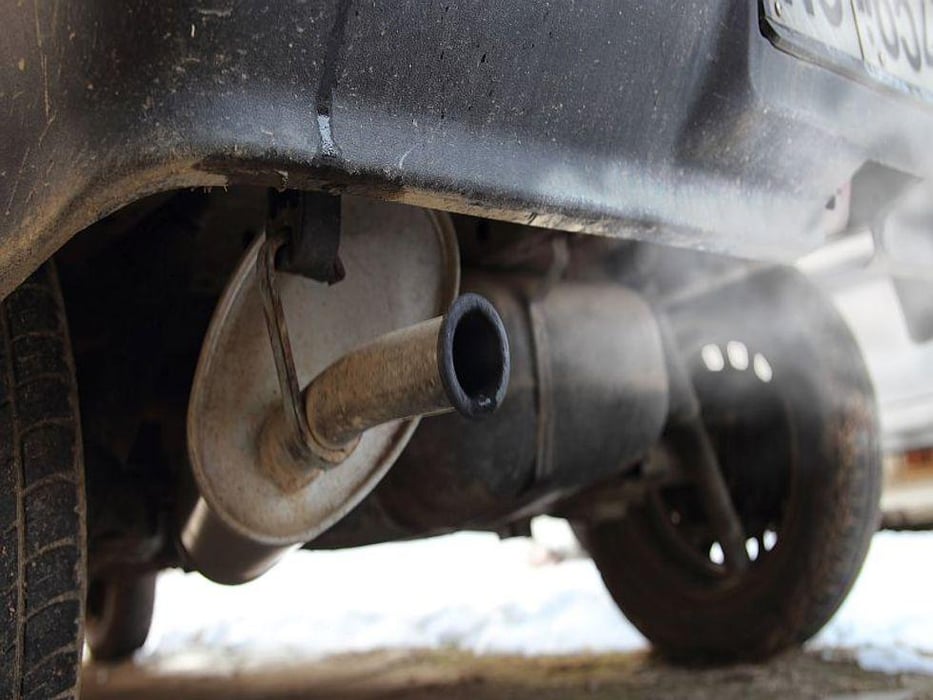Stuck in Traffic? Diesel Fumes May Be Harming Your Brain

MONDAY, Jan. 30, 2023 (HealthDay News) -- If you find yourself stuck in a traffic jam and you start to feel fuzzy-headed, the diesel exhaust from the truck in front of you might be to blame.
New research found that just two hours of exposure to diesel exhaust impaired the brain’s functional connectivity, which can lower your ability to think and remember.
"We compared people after diesel exhaust exposure compared to filtered air exposure. We saw that network had decreased activity," said lead researcher Jodie Gawryluk. She is an associate professor of psychology at the University of Victoria in British Columbia, Canada.
Fortunately, the effect doesn't last long, usually clearing in a couple of hours, Gawryluk said, but it's not known if long-term exposure to diesel exhaust can cause permanent brain damage.
"That's certainly a possibility," she noted. "There's studies ongoing right now looking at whether this could be a potential risk factor for neurodegenerative conditions like Alzheimer's disease."
In an earlier study, Aisha Dickerson, an assistant professor in the department of epidemiology at the Bloomberg School of Public Health at Johns Hopkins University in Baltimore, found that work exposure to diesel exhaust was linked to an increased risk for the neurodegenerative disease ALS (also known as amyotrophic lateral sclerosis or Lou Gehrig's disease).
It's very possible that long-term exposure can cause permanent brain damage, Dickerson said. "I would expect to see more damage in someone who had more frequent or even higher exposures to diesel exhaust," she added.
The risk is particularly acute for people who live near highways and heavily trafficked roads. These people tend to be poor — Black and Hispanic people and immigrants, Dickerson noted.
"I would expect them to have more exposures and subsequently more insults to the brain," she said.
"Diesel exhaust is definitely detrimental to the brain. We need to start working towards solutions to try reducing exposures to communities that live close to the roads," Dickerson suggested.
These efforts have to include new technologies, regulation of diesel emissions and locating highways away from residential communities.
In the lab, Gawryluk and her colleagues exposed 25 adults to diesel exhaust and then to filtered air. They used MRIs to assess the effects of these exposures on the brain.
The investigators found that diesel exhaust decreased functional connectivity in areas of the brain tied to reduced mental ("cognitive") performance, decision-making and symptoms of depression.
Gawryluk said the same effect is likely from exposure to gasoline exhaust and even smoke from wildfires.
She advised people "to be mindful of the air you're breathing, and try and take steps to minimize your exposure to potentially harmful air pollutants like car exhaust."
The report was published online recently in the journal Environmental Health.
"The findings of this study are deeply concerning," said Elizabeth Bechard, a senior policy analyst at Moms Clean Air Force. "They reinforce our understanding that breathing in toxic diesel exhaust isn’t only bad for our lungs and hearts, it’s also bad for our brains."
The implications for the health of children’s developing brains are especially troubling, Bechard said, "particularly because 20 million children ride buses to school every day and the vast majority of these buses are fueled by diesel. We already know that exposure to dirty diesel exhaust is linked to disruption in children’s cognition and academic performance; this new study may help us understand how diesel exhaust disrupts our brain function."
Bechard believes that transportation needs to be weaned off diesel and combustion engines in general. "Cities need to be more bikeable and walkable, as it encourages pollution-free transport that’s good for our bodies, as well," she said.
When diesel exhaust is unavoidable, you can take steps to reduce harm, Bechard noted.
"Parents may want to keep their car windows rolled up while driving down busy roads and make sure their car’s air filters are working well," she said. "Other strategies could include avoiding heavily trafficked roads or high-traffic hours whenever possible; reducing idling vehicles; and/or installing quality air filtration systems in schools and daycares to reduce children’s exposure to pollution from nearby roadways."
More information
For more on traffic pollution, head to the U.S. Environmental Protection Agency.
SOURCES: Jodie Gawryluk, PhD, associate professor, psychology, University of Victoria, Victoria, B.C., Canada; Aisha Dickerson, PhD, assistant professor, department of epidemiology, Bloomberg School of Public Health, Johns Hopkins University, Baltimore; Elizabeth Bechard, senior policy analyst, Moms Clean Air Force; Environmental Health, Jan. 14, 2023, online
Related Posts
IDSA: Intranasal Live-Attenuated COVID-19 Vaccine Induces Response
TUESDAY, Oct. 17, 2023 (HealthDay News) -- Two doses of a novel intranasal...
Industry Payments to Prescribers May Influence Choice of Eye Drops
FRIDAY, Aug. 26, 2022 (HealthDay News) -- Ophthalmologists and optometrists who...
Half of Dentists Say Patients Are Coming to Appointments While High
TUESDAY, Nov. 8, 2022 (HealthDay News) -- More and more nervous patients are...
AHA News: A Decade After Her Baby’s Heart Surgery, a Surgeon Fixed the Same Problem in Her Heart
MONDAY, March 27, 2023 (American Heart Association News) -- Cynthia Felix...
